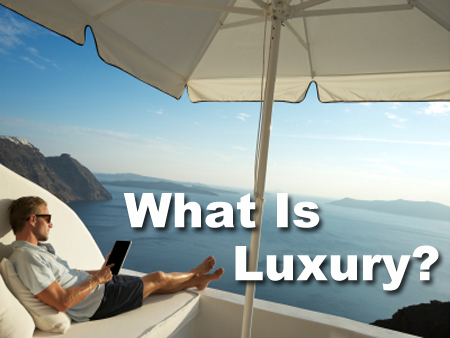
French reserachers Lobre & Lebraty say that the value of crowdsourcing lies in the innovativeness of ideas and in the authenticity of contributions. This post is about a specific case where crowdsourcing is being used by a company to get authentic market feedback from consumers: The What is Luxury contest on Zooppa. This competition has been sponsored by the agency Euro RSCG and asks videomakers to interview consumers about their perception of luxury. Since all the videos were available to everyone, I did a short content analysis… and found some interesting insights!
The contest was sponsored by Euro RSCG (which will soon be rebranded as Havas Worldwide, a strategic move for which they sollicited crowdsourcing platform Victors & Spoils), and I assume that they commissioned it for a client in the hotel industry. After a couple of questions about luxury in general, the brief indeed asks a couple of questions about luxury travel and hotels. This is not a typical creative crowdsourcing contest with an open brief, rather is it a “request for interviews” were people are asked to gather testimonials from luxury consumers in Brazil, China, Europe, India and the United States.
 Zooppa is an Italian-based crowdsourcing platform with offices in the Seattle, USA. These were the two markets that seem to be important for Zooppa, and it seems that their community comes from there too. Not surprisingly, almost 80% of the submitted videos were interviews of Italian or American consumers. Only 6 videos were interviews of Brazilian consumers, 4 of Indian 3 of Chinese consumers. Hence, it’s not correct to say that this contest reveals global insights about the perception of luxury in the world. But it still managed to get input from each of the five markets mentioned in the creative brief.
Zooppa is an Italian-based crowdsourcing platform with offices in the Seattle, USA. These were the two markets that seem to be important for Zooppa, and it seems that their community comes from there too. Not surprisingly, almost 80% of the submitted videos were interviews of Italian or American consumers. Only 6 videos were interviews of Brazilian consumers, 4 of Indian 3 of Chinese consumers. Hence, it’s not correct to say that this contest reveals global insights about the perception of luxury in the world. But it still managed to get input from each of the five markets mentioned in the creative brief.
Fashion, jewelery and cars best embody luxury today. This is what emerges from peoples’ answers to the questions “What brands really “get” luxury today?” and “What brands seem to have lost their luxury appeal?” that were asked in the brief. Brands like Gucci and Louis Vuitton seem to be both appreciated and depreciated by consumers, probably because they are top-of-mind brands in luxury. The videos also reveal that brands like Ferrari, Chanel or Cartier really get luxury today, while Calvin Klein, Pierre Cardin or Versace seem to have lost their luxury appeal. The reason for this loss of prestige is often the fact that a brand has become widely available or that there are counterfeit products on the market. Exclusivity is indeed highly valued by luxury consumers, as the following word cloud reveals.

Word cloud via wordle.com
These words are all the responses given by interviewees to the question “What are three words you would use to describe luxury today?.” Not surprisingly, you find items like exclusivity, quality and expensiveness to be top-cited criteria by consumers. Comfort was also cited very often, but one could question if it had appeared had the contest been about something else than hotel accommodations. Maybe this item is being overrepresented because people knew that the last set of questions was about hotel accommodation.

Word cloud via wordle.com
The above word clouds show what hotel chains people like and don’t like. More precisely, the first one gathers the answers to the question “What hotels really “get” luxury today?”, the second one shows what people responded to “What hotels have lost their luxury appeal?”. Probably the biggest surprise is that the Hilton brand seems to have lost a lot of its luxury appeal. Not every interviewee explains his answer, but when it comes to Hilton, several consumers say that the brand suffers from the exposure of party girl Paris Hilton, the heiress of the famous hotel chain. Another often cited reason by consumers is that the personnel does not treat them as special anymore.
The words that describe a luxury hotel experience today are in the following word cloud. Again, comfort is a very important feature for luxury consumers, at least as much as the level of service that they receive. Other important features include personalization, exclusivity and uniqueness which are similar to the words that people came up with to describe luxury in general.

Word cloud via wordle.com
I don’t know how Euro RSCG used the content, but I think they launched this contest as a cost-effective way to get insights about consumer perception of luxury in the tourism industry. Whether it was for a client pitch or for an existing client, the integrated marketing agency has received interesting client testimonials from around the world.
If they were to present it to the Four Seasons or the Ritz Carlton hotel chains, they can be relaxed ; if the client was Hilton, then they will have to be diplomatic in presenting the results! Either way, the contest shows that crowdsourcing is can be a cost-effective way to gather authentic data on a global scale and in a restricted time frame. If you want to see which videos won, you can check out the winners on Zooppa’s blog. And if you want to have a nice video that shows several consumers at a time, have a look at this one, submitted by UpNextStudios from the United Kingdom:





0 Comments